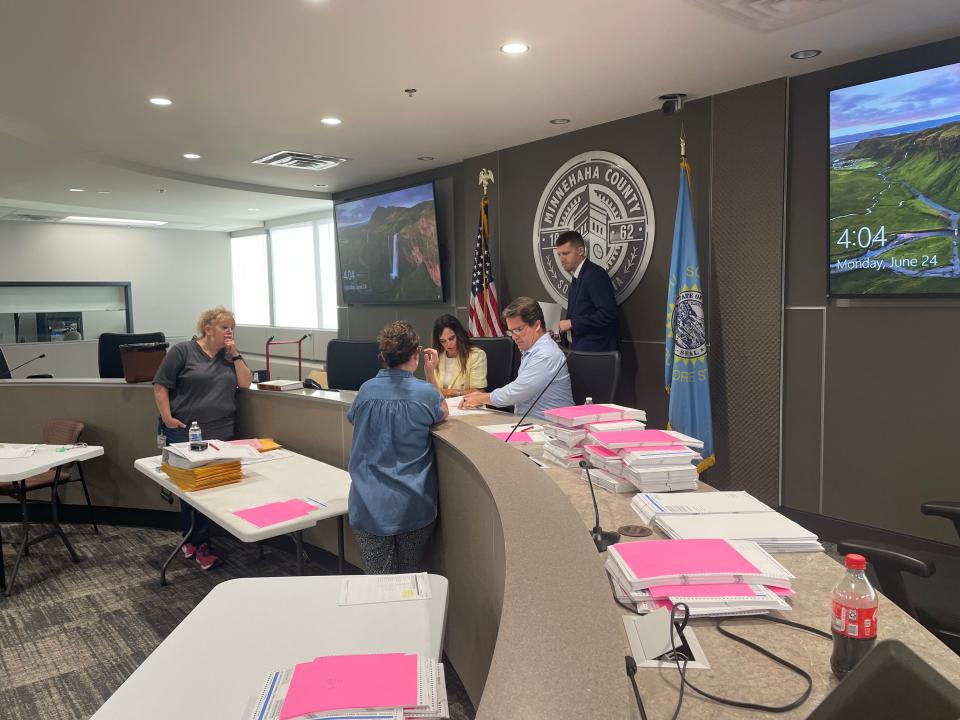Recount board opts to count 132 absentee ballots originally rejected in June 4 primary
Three of Minnehaha County's races from the June 4 primary had an official recount on Monday.
And while no races flipped, the recount board did opt to include 132 absentee ballots that had been rejected on Election Day, following a challenge that some state and county officials have said fell outside the bounds of state law.

The recount board consisted of Tyler Haigh, Cynthia Mickelson and Jon Sommervold — all three Republicans, as there were no Democratic candidates involved in any of the races.
The first two races went by with no changes. The board examined portions of the votes and the entire slate of ballots went back through the tabulators, showing the exact same results for the Precinct 2-03 committeeman race, where Corey Rehfeldt won over Allen Unruh, 90 votes to 89.
It was the same story for the District 11 State Representative race, where Brian Mulder and Keri Weems both advanced, each with exactly 627 votes. John Kunnari remained in third place with 617 votes.
In the county commissioner race, however, things went a little differently. Dean Karsky had taken the second-place spot in the primary by only 86 more votes than Roger Russell on June 4.
The recount board had the option to reinstate 132 votes that had been rejected on June 4, and chose to do so after examining the state statute regarding challenges.
While at first glance that appears to be enough votes to potentially flip the race, Minnehaha County Auditor Leah Anderson said early on that her informal count of the registered voters who had been involved showed only 81 registered Republicans — the only ballots where the commission race would have appeared.
Counting those ballots — and invalidating three ballots representing four votes during the recount process that had been counted on election day — slightly increased the gap by which Karsky beat Russell by 108 votes.
Why were ballots challenged in the first place?
On June 4, Jessica Pollema challenged a number of absentee ballots at precincts 4-16 and 5-16. While the precinct board at 5-16 rejected the challenge, the board at 4-16 upheld it, rejecting 132 of the absentee ballots Pollema had challenged.
More: Secretary of State's Office: Challenge to Minnehaha County ballots fell outside state law
Pollema is the president of South Dakota Canvassing Group, an organization which claims that the 2020 election showed "major problems" with the country's election systems, calls for a ban on mail-in voting, ballot harvesting and all voting machines and has a voracious support Anderson, with members often showing up in droves at Minnehaha County Commission meetings.
Pollema told the Argus Leader on June 4 that she was challenging the ballots based on voter registration forms that she said showed shared addresses at Sioux Falls post office boxes, a common practice in South Dakota where people who travel the country all or part of the year can spend a night in the state, establish it as their legal residence and have their mail forwarded to them.
But Minnehaha County State's Attorney Daniel Haggar, along with Chief Civil Deputy State's Attorney Eric Bogue, have told the Argus Leader that they presented to both precinct boards that the challenge was not permitted under state law, and that it was possible the voters could be homeless, or living full-time in an RV.
The South Dakota Secretary of State's Office agreed, with Director of the Division of Elections Rachel Soulek saying in a statement:
"We had advised a Minnehaha County official that per state law SDCL 12-18-10 on items that are challengeable, what was being challenged didn’t fall into those parameters. This is a county level matter, but we are deeply concerned and care about the voting right of all eligible voters."
The American Civil Liberties Union of South Dakota celebrated the ballots being counted.
"It's vitally important that people be allowed to exercise their rights to vote and to travel or to work and live out of state – without repercussions to either," ACLU Advocacy Manager Samantha Chapman said in a Monday morning statement.
In an updated statement following the decision, Chapman said:
"Because what happens during a primary election is typically a preview of what might come in the general election, we want to ensure that no improper challenges will be entertained in November and that no voters will be disenfranchised now or then."
The approval of the ballots was also a relief to Kevin and Carol Alishouse, RVers who spend much of their summers in Sioux Falls before heading out to escape the cold weather.
"South Dakota has benefited from us being here," Kevin Alishouse said, noting they license their vehicles here, pay excise taxes, and in his case, even recently served on a jury trial.
While the couple voted in-person in the June 4 election, the rejection of the ballots had them worried about whether they'd be able to vote in November or whether their ballots would be "thrown in the trash heap," he said.
"I’m so glad that everyone’s vote will be counted who voted" after the board decided to count the ballots, said Carol Alishouse, watching the recount Monday.
"I think justice is served," her husband added.
This article originally appeared on Sioux Falls Argus Leader: No races flip after Minnehaha County recount of June 4 primary

